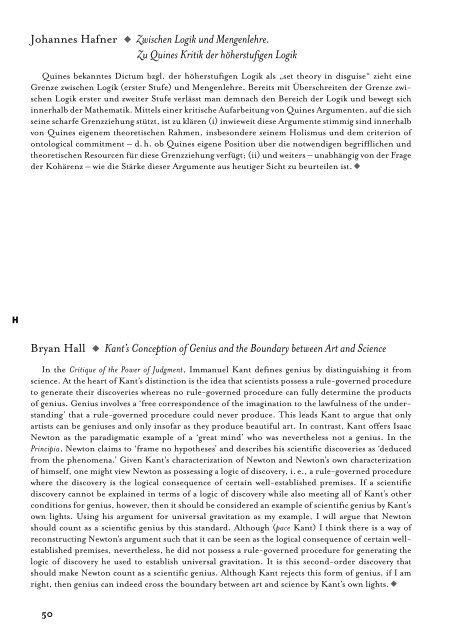Verlag.Buchhandel.Service. - Österreichische Gesellschaft für ...
Verlag.Buchhandel.Service. - Österreichische Gesellschaft für ...
Verlag.Buchhandel.Service. - Österreichische Gesellschaft für ...
Erfolgreiche ePaper selbst erstellen
Machen Sie aus Ihren PDF Publikationen ein blätterbares Flipbook mit unserer einzigartigen Google optimierten e-Paper Software.
H<br />
Johannes Hafner ◆ Zwischen Logik und Mengenlehre.<br />
Zu Quines Kritik der höherstufigen Logik<br />
Quines bekanntes Dictum bzgl. der höherstufigen Logik als „set theory in disguise“ zieht eine<br />
Grenze zwischen Logik (erster Stufe) und Mengenlehre. Bereits mit Überschreiten der Grenze zwischen<br />
Logik erster und zweiter Stufe verlässt man demnach den Bereich der Logik und bewegt sich<br />
innerhalb der Mathematik. Mittels einer kritische Aufarbeitung von Quines Argumenten, auf die sich<br />
seine scharfe Grenzziehung stützt, ist zu klären (i) inwieweit diese Argumente stimmig sind innerhalb<br />
von Quines eigenem theoretischen Rahmen, insbesondere seinem Holismus und dem criterion of<br />
ontological commitment – d. h. ob Quines eigene Position über die notwendigen begrifflichen und<br />
theoretischen Resourcen <strong>für</strong> diese Grenzziehung verfügt; (ii) und weiters – unabhängig von der Frage<br />
der Kohärenz – wie die Stärke dieser Argumente aus heutiger Sicht zu beurteilen ist. ◆<br />
Bryan Hall ◆ Kant’s Conception of Genius and the Boundary between Art and Science<br />
In the Critique of the Power of Judgment, Immanuel Kant defines genius by distinguishing it from<br />
science. At the heart of Kant’s distinction is the idea that scientists possess a rule-governed procedure<br />
to generate their discoveries whereas no rule-governed procedure can fully determine the products<br />
of genius. Genius involves a ‘free correspondence of the imagination to the lawfulness of the understanding’<br />
that a rule-governed procedure could never produce. This leads Kant to argue that only<br />
artists can be geniuses and only insofar as they produce beautiful art. In contrast, Kant offers Isaac<br />
Newton as the paradigmatic example of a ‘great mind’ who was nevertheless not a genius. In the<br />
Principia, Newton claims to ‘frame no hypotheses’ and describes his scientific discoveries as ‘deduced<br />
from the phenomena.’ Given Kant’s characterization of Newton and Newton’s own characterization<br />
of himself, one might view Newton as possessing a logic of discovery, i. e., a rule-governed procedure<br />
where the discovery is the logical consequence of certain well-established premises. If a scientific<br />
discovery cannot be explained in terms of a logic of discovery while also meeting all of Kant’s other<br />
conditions for genius, however, then it should be considered an example of scientific genius by Kant’s<br />
own lights. Using his argument for universal gravitation as my example, I will argue that Newton<br />
should count as a scientific genius by this standard. Although (pace Kant) I think there is a way of<br />
reconstructing Newton’s argument such that it can be seen as the logical consequence of certain wellestablished<br />
premises, nevertheless, he did not possess a rule-governed procedure for generating the<br />
logic of discovery he used to establish universal gravitation. It is this second-order discovery that<br />
should make Newton count as a scientific genius. Although Kant rejects this form of genius, if I am<br />
right, then genius can indeed cross the boundary between art and science by Kant’s own lights. ◆<br />
50


